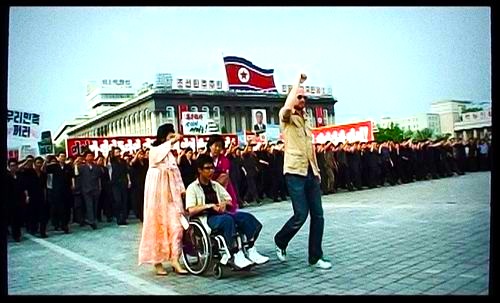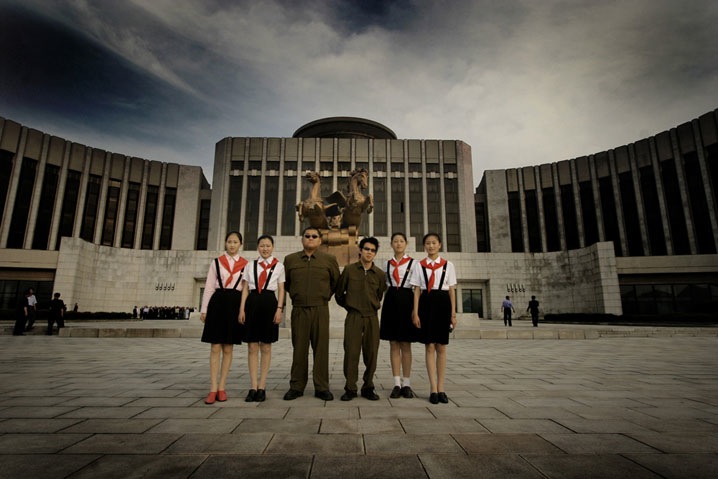[Editor’s Note: LFM will be covering a series of provocative films debuting this week and next at The Los Angeles Film Festival.]
By Joe Bendel. What a disclaimer. Danish director Mads Brügger explains all the footage the audience is about to watch had been thoroughly vetted by North Korean state censors. Yet his suspicion that the post-modern irony he would unleash on the world’s most isolated country would be lost on the Communist authorities proved largely correct. The gutsiest act of cinematic provocation perhaps ever, Mads Brügger’s The Red Chapel (trailer below) is a genuine highlight of this year’s Los Angeles Film Festival.
Ostensively, Brügger came to North Korea with two Danish Korean comedians, Simon Jul Jørgensen and Jacob Nossell, to stage a good will show. However, his real intent was to expose the unrelentingly oppressive nature of the DPRK system. Though submission to state censorship was a given right from the start, Brügger thought he had an ace in the hole: Nossell.
A self-described “spastic” (Nossell’s words, not mine), the subversive director knew Nossell would make the North Koreans uneasy, since those born with disabilities simply do not survive in their socialist paradise. Brügger also hoped Nossell would be able to speak freely on film, because none of the censors would understand his “spastic Danish” (Brügger’s words, not mine).

As soon as the Danes arrived in the North, their minder, Mrs. Pak, fastened herself to them like glue. Her response to Nossell was particularly bizarre, almost smothering him with attention. However, even Mrs. Pak could not fake an enthusiastic response to the program the comedians had prepared. Featuring skits in drag and an unclassifiable rendition of Oasis’s “Wonderwall,” it was not just bad, it was awe-inspiringly awful. It is hard to say which is funnier, their variety show on crack, or the stone-face reactions of their hosts. However, seeing the propaganda potential of the show, the North Korean authorities set about adapting it to their ideological purposes, making it “more Korean.” So much for cultural exchange.
While Chapel is at times a riotous exercise in comedic performance art, the overall film is as serious as a heart attack. The pathological nature of DPRK society weighed particularly heavily on Nossell, causing frequent rifts between him and the director. It all comes to a head when Nossell very publicly refuses to participate in one of the regime’s big, scary anti-American mass demonstrations. It is a scene fraught with its own irony, as Brügger – the rebellious gadfly – tries to cajole his countrymen into professing support for what he calls the regime’s “mother lie,” the Communist myth that American aggression precipitated the Korean War.
Though he makes a noble effort, Brügger fails to capture the smoking gun scene that would utterly lay bare the nature of North Korean tyranny. Of course, he was doomed from the start, because the Communists set all the rules and could change them at their convenience. Still, there are plenty of telling moments (particularly the climactic demonstration), as well as some outrageous humor.
Chapel has been compared to The Yes Men, but that does not do Brügger justice. Unlike the play-it-safe leftist pranksters, Brügger was punking a target that exercises absolute, unchecked power – on its own turf. Based on the DPRK’s apoplectic response to the film, it is doubtful Brügger will ever return to make a sequel. He probably will not miss the place. Beyond surreal, Chapel simply has to be seen to be believed. Enthusiastically recommended, it screens Saturday (6/19) and Thursday (6/24) during the 2010 LAFF.
Posted on June 17th, 2010 at 10:31am.


An excellent review. As you say, these filmmakers risked their lives infinitely more to make this documentary than anything the pseudo-leftists have done. Where is the danger in mocking American corporations as in the “Yes Men”? Far more dangerous to mock the North Koreans, as these Danish filmmakers have bravely done.
I found this trailer to be heartbreakingly sad. Yes, it is subversive, but somehow the director found a way to make the footage also very poignant.